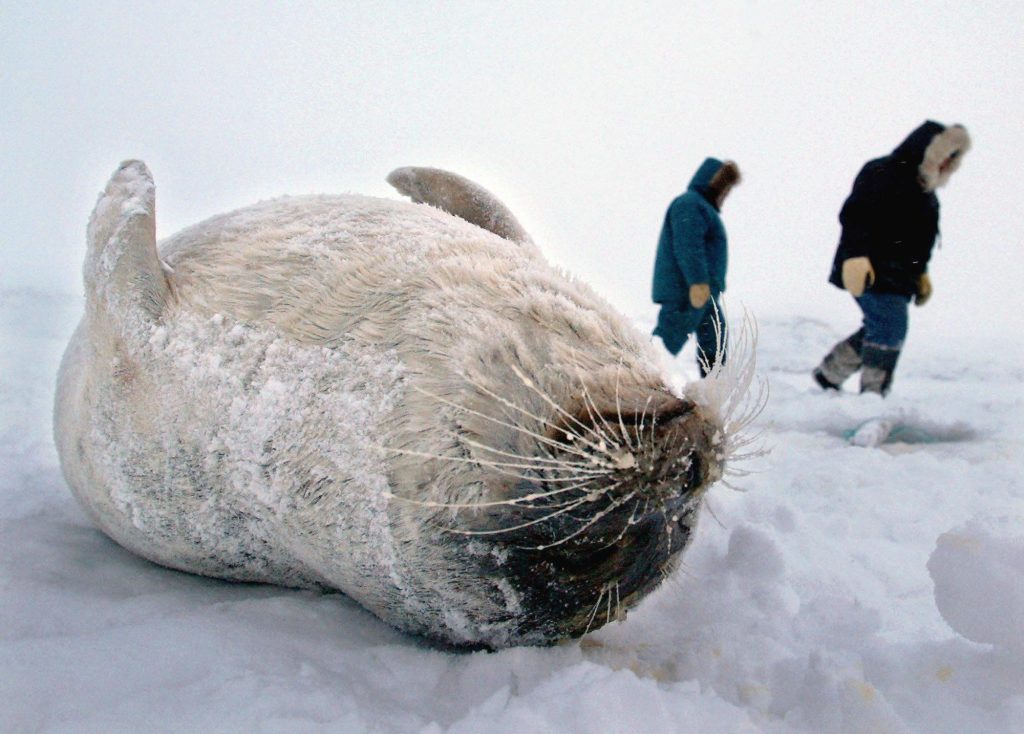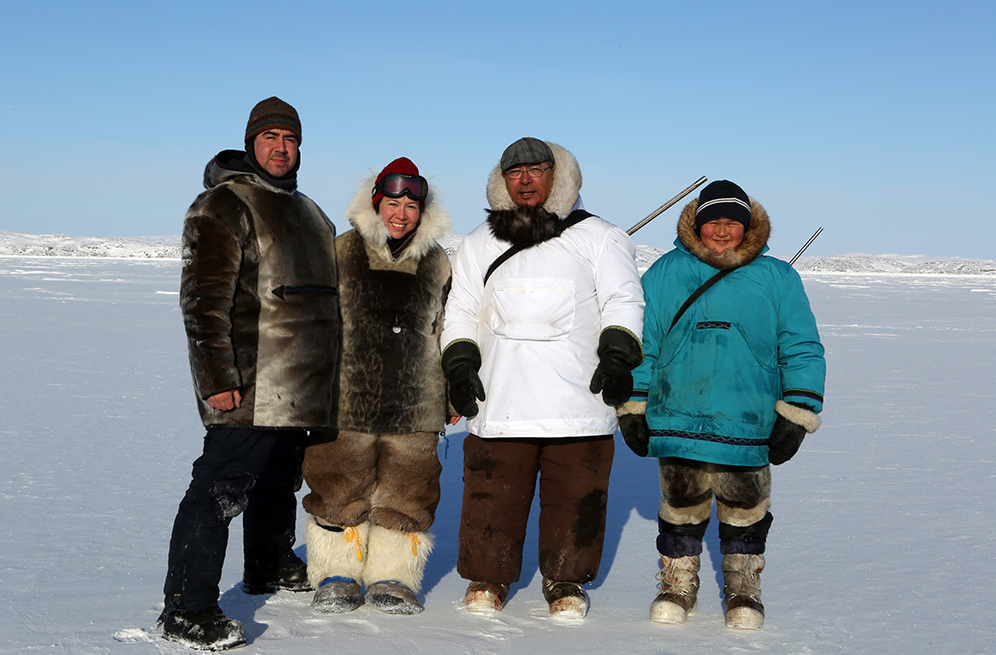Switzerland joins growing list of countries having banned seal product imports

Switzerland has become the latest country to introduce a ban on the import of seal products, joining a similar ban adopted the by the European Union in 2009.
The decision adopted by the Swiss federal parliament on March 3 means that as of April 1, 2017 trade in products of commercial, non-indigenous seal hunts, including seal skins, oil, meat and organs, will be prohibited in Switzerland.
Just like its EU counterpart, the Swiss legislation exempts the “traditional hunt” carried out by Indigenous northern communities from the ban.
However, it’s unclear how Swiss officials can distinguish seal products made from seals harvested by Inuit hunters from those derived from the annual seal hunt in the Gulf of St-Lawrence by East Coast fishermen.
Animal rights groups applauded the move, which came a month before the East Coast seal hunt.
“In banning its trade in products of commercial seal slaughters, Switzerland is helping to spare countless defenseless seal pups from unimaginable cruelty,” said a statement from Rebecca Aldworth, executive director of Humane Society International/Canada. “More than 35 nations have already adopted similar legislation, and it is clear that global markets for seal products are closing forever.”
It is time the Canadian government took steps to phase out the commercial seal hunt and invest in a fair transition program for sealers, she added.
‘Inherently inhumane?’
The Canadian Sealers Association (CSA), on the other hand, accuses the animal rights group who lobby for the seal ban of making false claims to support their campaigns.
“The hunting of harp seal pups (whitecoats) and hooded seal pups (bluebacks) is illegal – and has been since 1987,” said a statement from the CSA. “Marine Mammal Regulations prohibit the trade, sale or barter of the fur of these pups.”
The sealing group also disputes the notion that the use of clubs by sealers is “inherently inhumane.”
“Clubs have been used by sealers since the onset of the hunt hundreds of years ago. Hakapiks originated with Norwegian sealers who found it very effective,” the CSA says. “American studies carried out between 1969 and 1972 proved that the club or hakapik is an efficient tool designed to kill the animal quickly and humanely. A 2002 report published in the Canadian Veterinary Journal had results that parallel these findings.”
Inuit opposition

Inuit groups also oppose the seal bans by the EU, U.S. and other countries. They argue that seal product exemptions for Indigenous groups such as the one provided by the Swiss legislation are meaningless because these bans have destroyed the international market for seal products that Inuit rely on to sell products derived from the Inuit seal hunt.
Award-winning Inuit filmmaker Alethea Arnaquq-Baril says the well-funded anti-sealing campaigns by groups such as the International Fund for Animal Welfare (IFAW), PETA and Greenpeace have focused their attention on the seal harvest in the Gulf of St. Lawrence, completely ignoring the fact that the majority of Canada’s sealers are Inuit.
“It’s kind of like we’re just a footnote in that discussion,” Arnaquq-Baril said in a recent interview with RCI. “I think when groups lobbied for the European Union to pass bans on seal products, as well as in the States with the Marine Mammals Protection Act, they either knowingly kind of erased Inuit from that discussion or are completely unaware.”
Seal meat is a staple food for Inuit and money from the sale of their pelts helps to offset the extraordinary cost of modern life in the Arctic.
“Seals have always been important we’re the people of the seal,” Arnaquq-Baril said. “That’s who we are, it’s part of our identity, it’s part of our culture, and it’s how we survived in one of the harshest climates on the planet for the millennia.”
No impact on Canada-Switzerland trade
Swiss authorities say since Switzerland does not import seal products from Canada anyway, the Swiss ban will have little impact on the Inuit.
“It is also the view of the Swiss Government that the exemption granted for products stemming from the traditional hunt by Inuit communities does not unnecessarily prevent their traditional way of living and allows them to continue to exercise their right to hunt in a traditional way,” said Mathias Lörtscher, a high-ranking official with the Swiss Federal Food Safety and Veterinary Office.
The HIS points out that global markets for seal products are closing fast. In 2009, the European Union joined the United States, Mexico and Croatia in prohibiting trade in products of commercial seal hunts, the group said in a statement. In 2011, the Customs Union of Russia, Kazakhstan and Belarus prohibited trade in harp seal fur, and in 2013, Taiwan ended its trade in all marine mammal products.
“By banning our trade in commercial seal products, Switzerland is refusing to participate in the cruelty of commercial sealing,” Vera Weber, president of the Swiss-based Franz Weber Foundation, who has observed Canada’s commercial seal hunt for four years, said in a statement. “I am so proud that Switzerland has ensured we will never become a replacement market for Canadian seal products in the wake of the EU ban on seal product trade.”
Arnaquq-Baril says the animal rights campaigners need to understand that sealing is an environmental issue.
“Inuit need to have a sustainable economy in order to be able to avoid rushing into damaging resource extraction economy,” Arnaquq-Baril says. “If people care about animals and they care about the environment, they have to be supporting the Inuit seal hunters who are out on the land, who’re out on the water fighting to protect the environment.”
Related stories from around the North:
Canada: Canadian Inuit blast ruling on continued EU seal ban as ‘morally reprehensible’, Eye on the Arctic
Denmark: Reinstilling pride in the Inuit seal hunt, Eye on the Arctic
Finland: Utsjoki residents at odds over Tenojoki salmon fishing restrictions, Yle News
Greenland: What the EU seal ban has meant for Inuit communities in the Arctic, Eye on the Arctic
Iceland: Feature Interview – Hunting culture under stress in Arctic, Eye on the Arctic
Russia: Russia declares another indigenous group ‘foreign agent’, The Independent Barents Observer
Sweden: European sealskin ban affects Sámi handicraft workers, Radio Sweden
United States: Ivory bans in contiguous U.S. hit Alaska Native carvers hard, Alaska Public Radio Network



